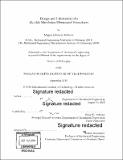Design and fabrication of a flexible membrane ultrasound transducer
Author(s)
Roberts, Megan Johnson
DownloadFull printable version (24.31Mb)
Other Contributors
Massachusetts Institute of Technology. Department of Mechanical Engineering.
Advisor
Brian W. Anthony.
Terms of use
Metadata
Show full item recordAbstract
Wearable ultrasound sensing could enable novel medical diagnostics by facilitating continuous, real-time, and direct measurement of physiological phenomena, such as blood pressure. Currently, ultrasound is not used in wearable health sensing applications because clinical ultrasound systems are expensive, bulky, and require high operating power. Realizing wearable ultrasound therefore requires significant reductions in cost, size, and power consumption. Manufacturing cost is of particular concern because sensors are frequently incorporated into consumer goods, where cost is a key driver of technology adoption. Toward that goal, this thesis explored the first steps toward the opportunity to fabricate low-cost ultrasound transducers by contact printing. Contact printing was selected because it could be scaled for high-throughput manufacturing, and it could be performed at ambient temperature and pressure. For this thesis, a capacitive microscale ultrasound transducer was fabricated by contact printing a gold-parylene composite flexible membrane onto a silicon chip substrate. Significant challenges with the adhesion between the membrane and the chip were overcome during fabrication process development and a high yield process for the contact printing step was developed. The transducer was characterized for electromechanical performance. The first mode resonant frequency of the transducer was 2.2MHz, with a 2MHz bandwidth, placing it in the range of interest for medical ultrasound applications (typically 1-15MHz). These results demonstrate that flexible membrane ultrasound transducers can be fabricated. Furthermore, they illuminate a path toward wearable ultrasound sensing and more broadly, flexible medical devices.
Description
Thesis: Ph. D., Massachusetts Institute of Technology, Department of Mechanical Engineering, 2018. Cataloged from PDF version of thesis. Includes bibliographical references (pages 143-152).
Date issued
2018Department
Massachusetts Institute of Technology. Department of Mechanical EngineeringPublisher
Massachusetts Institute of Technology
Keywords
Mechanical Engineering.